Rabbi Joe’s Torat Tel Aviv
Experience Rabbi Joe Wolfson’s popular THINK class from wherever you are. This podcast brings you recordings of the weekly Monday night sessions in Tel Aviv, where Rabbi Wolfson explores the intersection of Jewish thought, contemporary issues, and timeless wisdom. Through careful textual analysis and lively discussion, Rabbi Wolfson guides participants in examining classical Jewish sources while grappling with modern ethical dilemmas and philosophical questions. Whether you’re a seasoned learner or new to Jewish studies, THINK offers an accessible yet intellectually rigorous space to deepen your understanding and challenge your perspectives. Now available as a podcast, you can join the hundreds of weekly attendees who gather to explore what Judaism has to say about the pressing issues of our time.
Episodes

Monday Jul 14, 2025
Monday Jul 14, 2025
The story of Pinchas and his zealotry is rich and multi-layered - and it is full of ideas deeply relevant to our own moment.
An act of violence to forcefully stop a desecration of God's name brings an end to the plague and clearly receives God's praise and gratitude. Yet below the surface there is more that meets the eye with much to say about the relationship of peace and power and the complimentary opposition of kana'ut (zealotry) and kehuna (priesthood)
Source sheet here

Wednesday Jul 09, 2025
Wednesday Jul 09, 2025
In our parsha Balak, the king of Mo'av, hires the services of the pagan prophet Bilam. What are Bilam's motives? Does he really want to curse Israel, is he in it for the money or is he actually an obedient servant of God?
Source sheet here

Wednesday Jul 02, 2025
Wednesday Jul 02, 2025
In honour of the sheva brachot of our dear community members, Sam Simons and Leah Seiff, we take inspiration from Yirmiyahu's description of the desert as the setting of God and Israel's early romance to explore themes of love and relationship in the parsha
Source sheet here
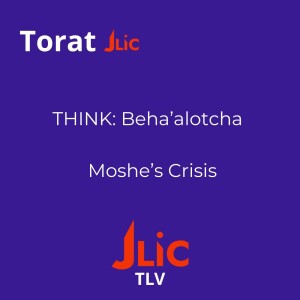
Wednesday Jun 11, 2025
Wednesday Jun 11, 2025
In this week's class on Parshat Beha'alotcha we begin by looking at one of the turning points in the book of Bamidbar - the move from the dream and vision to the harsh reality of the journey to the Promised LandWe then turn to Moshe's apparent breakdown as he says that leading the people after their complaints is a burden too great to carry. The class is based on Bamidbar (Numbers) chapter 12.Source sheet hereThese shiurim have been generously sponsored by Yaacov & Monique Ginsburg ilui nishmat Yaacov ben Bessi
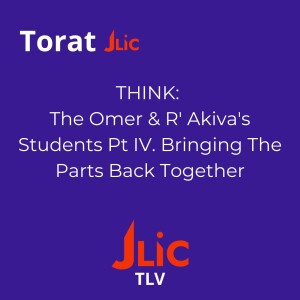
Tuesday May 27, 2025
Tuesday May 27, 2025
Our final instalment in the series examining the death of Rabbi Akiva's students during the omer for not honouring one another.In this class we look at Rabbi Eliezer's life after the oven of Akhnai and suggest that within the brilliantly creative approaches of Rabbi Akiva and Rabbi Yehoshua to Torah study are contained the seeds for potential conflict bein adam l'chaveiroSource sheet hereGenerously sponsored by Yaacov & Monique Ginsburg l'ilui nishmat Yaacov ben Bessi and in memory of our dear community member Avigayil bat Sarah on the occasion of her shloshim
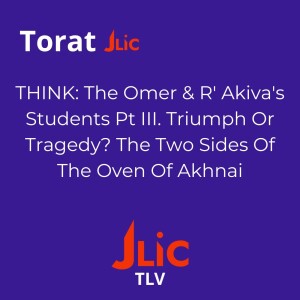
Tuesday May 20, 2025
Tuesday May 20, 2025
Is the story of the oven of Akhnai the greatest triumph or a terrible tragedy? Last week we read the first half of the story and it's trumphal line of lo bashamayim hi - the Torah is not in heaven and its depiction of God laughing. This week we read the second half of the story which pushes in a very different direction.The text of the Akhnai story is here (reading the story, especially the second half, is recommended to understand the class) and the other sources discussed in the story are here---A recap of the series thus far:Rabbi Akiva’s students died because they couldn’t honour one another. We use this text to ask two questions:
How should Torah be learnt?
How should we treat one another?
Until now our learning has focused upon the first question - how should Torah be learnt?
In our first class, with Judaism at a crossroads after the destruction of the Temple, we saw two approaches to this question:
Rabbi Eliezer: retaining the traditions and the mesora
Rabbi Yehoshua / Rabbi Akiva: chiddush and debate
We asked, is this simply a question of educational methodology or is it even one of theology?
Last week, in part II, we saw the clash of these approaches in that most famous of stories, the oven of akhnai.
We saw Rabbi Eliezer - who a heavenly voice says is always correct - have his arguments rejected by Rabbi Yehoshua and his colleagues. The rallying cry is lo bashamayim he - the Torah is not in heaven, it is down here on earth for us to decide, with human intelligence - aharei rabim l’hatot - to attempt to convince one another, and the law follows the majority.
If you finish reading the story where we did it appears as a great triumph. Hashem is laughing, the Torah is made eternal, nitzchuni banai - Talmud Torah is enthroned, Torah and the Jewish people can survive.
All of this is true but it is not the end of the story.
Because the story carries on and it pushes in what seems to be quite a different direction
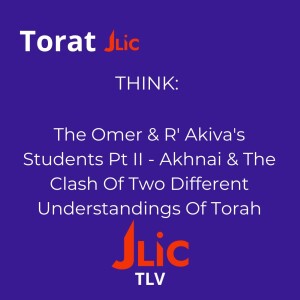
Tuesday May 13, 2025
Tuesday May 13, 2025
In our first class we contrasted the approach to Torah study of Rabbi Eliezer with that of Rabbi Akiva and Rabbi Yehoshua - asking whether Torah story is an exercise of creative insight or a focus on tradition and that which has been said by our teachers before us.Today we see how these two different approaches collide in perhaps the most famous of all Talmudic stories, the oven of Akhnai - and the declaration of lo bashamayim he - that the Torah is not in heavenSource sheet hereThis class is generously sponsored by Yaacov & Monique Ginsburg ilui nishmat Yaacov ben Bessi - and celebrates too the release and return to his family of Edan Alexander
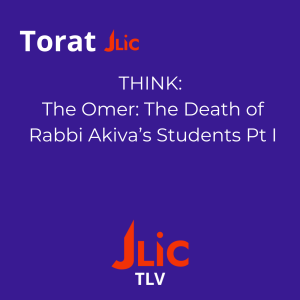
Thursday May 08, 2025
Thursday May 08, 2025
For the next few weeks we will do a deep dive into the world of Rabbi Akiva and his students. Many are familiar with the teaching that it is the death of thousands of Rabbi Akiva’s students during this period that initially lent the omer an element of mourning (in addition to one of joy). The reason for their death? Because they didn’t treat one another with the respect and care that they each deserved
We will try to recreate the world that they inhabited, and in so doing discover a uniquely important period that shaped the direction of Judaism in general and Jewish learning in particular
Tonight we look at the unique historical with the Jewish future at a crossroads and the starkly contrasting approaches to Torah learning of Rabbi Akiva and his teacher Rabbi EliezerSource sheet here
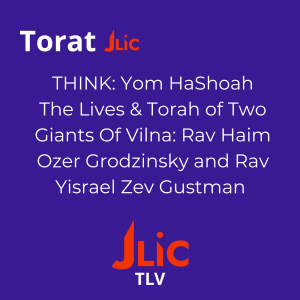
Wednesday Apr 23, 2025
Wednesday Apr 23, 2025
In this Yom HaShoah class we enter the world and learn the stories of two of the great rabbinic giants of Vilna - Rav Haim Ozer Grodzinski and Rav Yisrael Zev Gustman. The first was the last great leader of Vilna Jewry and we read the piece describing his funeral 'The Day Vilna Died'.
The latter was the youngest Dayan of Vilna whose story is one of survival and the world that he built in Israel after the war and who articulated a powerful and unique take on God and the Shoah. The rest of the sources are available here Learning about and honouring their lives and Torah is a fitting way to mark Yom HaShoah
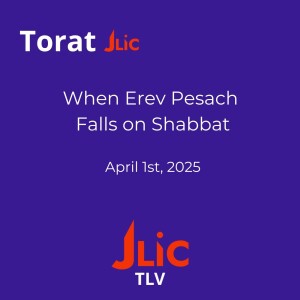
Thursday Apr 03, 2025
Thursday Apr 03, 2025
This year the eve of Pesach falls on Shabbat which presents us with some unique challenges. This shiur discusses how and when the search, annulment and destruction of chametz works in a year such as this, as well as the fast of the firstborn and how best to do the shabbat meals.
Source sheet and summary guide here






